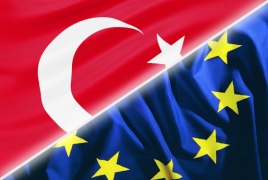
The European Union is set to curb contacts and funding for Ankara in retaliation for what it calls Turkey’s “illegal” drilling for gas and oil off Cyprus and stands ready to ramp up sanctions further, a draft statement seen by Reuters shows, according to Reuters.
In trying to take Ankara to task over what the EU sees as Turkish interference with Cyprus’ exclusive economic zone, the bloc is walking a thin line, careful not to antagonise an important partner.
“Despite our best intentions to keep good neighbourly relations with Turkey, its continued escalation and challenge to the sovereignty of our Member State Cyprus will inevitably lead the EU to respond in full solidarity,” Donald Tusk, president of the European Council of ministers, said on Wednesday.
On Thursday, national envoys in Brussels were discussing a joint decision to punish Turkey, a draft of which said:
“In light of Turkey’s continued and new illegal drilling activities, the (EU) decides to suspend negotiations on the Comprehensive Air Transport Agreement and agrees not to hold further meetings of the high-level dialogues for the time being.”
“The Council endorses the (European) Commission’s proposal to reduce the pre-accession assistance to Turkey for 2020 and invites the European Investment Bank to review its lending activities in Turkey, notably with regard to sovereign-backed lending,” it said.
It added that the EU would be ready to introduce more restrictive measures against Turkey should Ankara continue drilling.
In 2014-20, the EU was due to give Turkey 4.45 billion euros ($5 billion) for political reforms, agriculture and other projects to help it prepare for eventual membership of the bloc.
But last year, Brussels took away 175 million euros in protest at what it saw as deteriorating human rights in Turkey. The EU has said Ankara under President Tayyip Erdogan is moving further away from the bloc.
But, as the bloc needs Turkey in matters such as security and migration, an EU diplomat involved in the latest discussions told Reuters any future sanctions would be limited.

